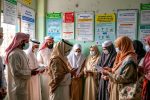Children and Infants Travel Vaccines Recommendations
Planning international travel with your children? Safeguard their health with crucial vaccinations tailored to their age and destination. From measles outbreaks to malaria risks, understanding recommended immunizations like Hepatitis A, MMR, and typhoid is vital for a worry-free trip. Discover essential travel vaccine insights and ensure your child’s protection by consulting a healthcare professional 4-6 weeks before departure. Don’t wait, start planning for a healthy and safe journey today!
Important information

- Consult a doctor 4-6 weeks before traveling to discuss your child’s vaccination needs based on their age, health, destination, and planned activities.
- Commonly recommended travel vaccines for children include Hepatitis A and B, typhoid, and MMR (measles, mumps, and rubella).
- Malaria is a serious risk in some regions. Take precautions against mosquito bites.
- Some countries require specific vaccinations for entry (e.g., yellow fever).
- Check the CDC and WHO websites for destination-specific health advice.
Understanding Children and Infants Travel Vaccines Recommendations
Protecting your child’s health during travel involves essential vaccinations against regional diseases. The recommended vaccines depend on the child’s destination, age, and previous immunizations. Commonly recommended travel vaccines include hepatitis A and B, typhoid, and MMR (measles, mumps, and rubella). Consulting a doctor is crucial to determine the appropriate vaccinations for your child’s specific trip. Malaria, a potentially fatal disease, poses a significant threat to children in certain regions. Parents should be aware of this risk and diligently protect their children from mosquito bites in affected areas.
Routine Childhood Immunizations for Travel
Planning international travel with children? Ensure your child’s routine immunizations are up-to-date for safe travels. Consult a healthcare professional 4-6 weeks before departure. They can assess your child’s specific vaccination needs based on their age, health, and destination. This timeframe allows vaccines to provide full protection. Some destinations may require additional vaccines or multiple doses. Planning ahead is crucial for healthy travels.
Importance of Completing Routine Immunizations Before Travel
Start vaccinations 4-6 weeks prior to departure. This allows your child’s body enough time to develop immunity, especially as some vaccines may require multiple doses.
Consult your doctor. Review your child’s vaccination history and discuss any destination-specific vaccination requirements.
Maintain updated immunization records. This is crucial for verification and future travel.
Consider avoiding areas with malaria. Infants and children are particularly vulnerable, so this precaution minimizes potential health risks.
Essential Travel Vaccines for Infants and Children
Safeguard your children’s health with crucial travel vaccinations. Essential immunizations such as Hepatitis A, MMR, and polio are typically recommended. Depending on your destination, your child might also need the quadrivalent meningococcal conjugate or typhoid vaccine. Discuss your itinerary and your child’s age with your doctor to determine the most appropriate vaccinations. Additional vaccines, such as hepatitis B, varicella, yellow fever, or Japanese encephalitis, could be necessary based on your travel region. Consult a healthcare professional for expert advice to ensure a safe and healthy journey.
Should Infants Get Hepatitis A Vaccine Before Travel?
If you’re traveling with a baby to a region with moderate or high hepatitis A risk, vaccination is recommended. Consult your doctor for a personalized risk assessment based on your destination.
Why Children Need the MMR Vaccine
The MMR vaccine protects children from measles, mumps, and rubella, and is especially important for travel, particularly to regions experiencing measles outbreaks. Infants between 6 and 12 months old should receive the MMR vaccine before traveling to areas where these diseases are present. For those going to high-risk measles zones, vaccination is possible as early as 6 months of age for increased protection.
How the Quadrivalent Meningococcal Conjugate Vaccine Protects
The quadrivalent meningococcal conjugate vaccine safeguards against meningococcal disease. It is a crucial immunization for children aged two months to 18 years venturing to sub-Saharan Africa. This vaccine is essential for their well-being in the region.
Is the Polio Vaccine Necessary for Travelers?
Planning a trip to a polio-affected region? Vaccination is crucial. It protects against poliomyelitis, a severe illness that can cause disability or even death. The vaccine is recommended for travel to areas with wild poliovirus. It also safeguards against vaccine-derived poliovirus.
Understanding Rabies Preexposure Prophylaxis
Traveling to a region where rabies poses a risk? Consider rabies pre-exposure prophylaxis (PrEP) for your children. This three-dose vaccine series primes their immune systems to fight the virus, providing crucial protection in case of a bite from a rabid animal. Consult your physician to evaluate your child’s individual risk and determine if PrEP is advisable.
Why the Typhoid Vaccine Is Crucial for Certain Destinations
Planning a trip to a region where typhoid is a concern? A typhoid vaccine offers protection against *Salmonella Typhi*, the bacteria responsible for this severe illness. Safeguard your health and travels by getting vaccinated.
Yellow Fever Vaccination for Infants and Children
For babies and children 9 months and older traveling to areas with yellow fever, vaccination is a good idea. Ensure they’re protected.
Age-Specific Vaccine Recommendations
Protecting your baby’s health during international travel is crucial, especially for infants under one year old. Consult your pediatrician to create a personalized vaccination plan based on your baby’s health, your destination, and potential disease exposure.Older children, especially those over eleven, should also have their vaccinations reviewed. A healthcare provider can assess their immunization history and recommend any necessary booster shots or additional vaccines for their travel destination. Planning ahead is essential.
Vaccinations for Children Under 1 Year
Traveling with your baby? Vaccinations might be necessary depending on your destination. For example, babies as young as six months can receive the MMR vaccine if traveling to a region with a high risk of measles. The hepatitis A vaccine is usually administered to children over a year old, but younger infants might need it depending on their travel plans. Consult your pediatrician to determine the necessary vaccinations for your baby’s trip.
Vaccinations for Children Over Age 11
Children 11 and older traveling internationally should receive the meningococcal A vaccine for their protection. Additionally, maintaining routine immunizations, such as the MMR vaccine, which guards against measles, mumps, and rubella, is vital. These illnesses pose significant health risks, making vaccinations essential.
Destination-Specific Vaccine and Health Precautions
Planning a trip? Protecting your family’s health is crucial, and vaccinations play a vital role. The vaccines you need depend on your destination. While children and adults face comparable health risks abroad, the impact on children can be far greater. Consult your doctor to determine the appropriate vaccinations for your child’s itinerary. Several factors influence this decision: your child’s age and overall health, the trip’s destination and duration, and the planned activities. Some countries even mandate specific vaccinations for entry, like proof of yellow fever vaccination.
How to Determine Destination-Specific Vaccines
Before traveling with your child, consult their pediatrician. The doctor will evaluate factors such as your child’s age, overall health, destination, trip duration, and planned activities to assess potential health risks. Some destinations have increased rates of specific diseases. For destination-specific health advice, consult the CDC and WHO websites for a safe and healthy trip.


















